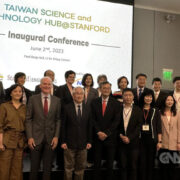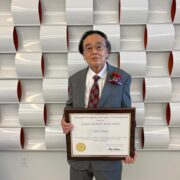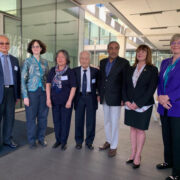廖俊智獲頒國際獎項 籲利用代謝工程因應全球暖化
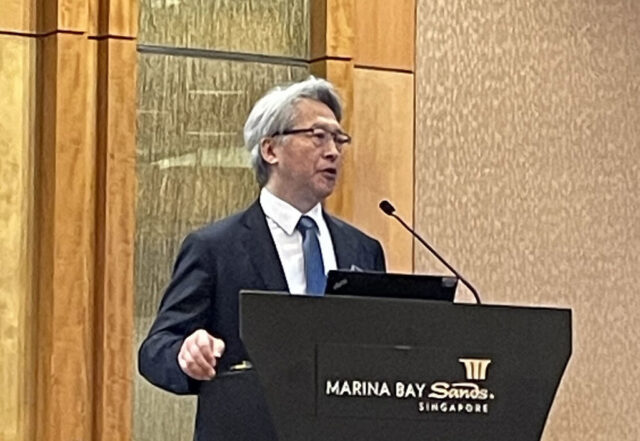
中央研究院院長廖俊智赴新加坡出席代謝工程國際學術研討會,13日獲頒Greg Stephanopoulos獎並發表演說。(胡育誠提供) 中央社記者侯姿瑩新加坡傳真 112年6月13日
(中央社記者侯姿瑩新加坡13日專電)中央研究院院長廖俊智赴新加坡出席代謝工程國際學術研討會,今天獲頒Greg Stephanopoulos獎,研究創新再獲肯定。他表示,全球力推減碳之際,代謝工程也可用於全球暖化的因應。
「第15屆代謝工程」(Metabolic Engineering 15)國際學術研討會11日至15日在新加坡舉行;研討會主要探討代謝工程如何提升農業、生物製造、醫藥等領域的發展。
廖俊智赴星出席會議,今天在會中獲頒Greg Stephanopoulos獎項並以「未來社會的代謝工程」為題發表演說。
Greg Stephanopoulos獎是國際代謝工程學會(International Metabolic Engineering Society)為讚揚麻省理工學院教授史蒂法諾普洛(Gregory N. Stephanopoulos)在代謝工程領域開啟量化分析及設計之貢獻而設立的獎項,表揚在代謝工程相關研究發展有重要貢獻的科學家或工程師。
繼丹麥基金會BioInnovation Institute執行長尼爾森(Jens Nielsen)教授之後,廖俊智是該獎項成立以來第2位受獎人。
廖俊智接受中央社記者訪問表示,這個獎項主要肯定將基礎研究轉化到對實際社會有貢獻的研究人員;能獲得這個獎項,「覺得非常光榮」。他從事代謝工程及合成生物學領域研究多年,這次獲獎主要是創新部分受到肯定。
廖俊智也在演說中分享如何利用代謝工程及合成生物學改善全球暖化的情況。
他表示,二氧化碳排放量逐年上升,全世界需要在2050年急速降低二氧化碳排放量,「這些就是整個地球的代謝」。代謝工程應該利用於全球暖化的因應,也能帶來一些貢獻。
廖俊智指出,這部分仍在早期研發階段,台灣有些團隊,包括他領導的團隊,已著手研究,目前主要方向是希望利用代謝工程及合成生物學來生產一些化學品,取代現有石油產品。
他在演講中提及利用相同技術、原理,思考如何增加光合作用以改善氣候變遷、全球暖化,將規模做到整個地球代謝的部分。
根據中研院網站資料,廖俊智長期從事代謝系統改造、合成生物學、系統生物學及微生物合成燃料等基礎前瞻科學研究,研發的異丁醇生物合成技術已被應用於生質燃油製造。將細菌裡的不同物質轉化成化學品,以生物取代石油生產化學品,是他另一項重大科學突破。
廖俊智曾獲多項國際研究獎項,包括美國白宮再生能源創新獎、義大利ENI再生能源獎及2021年以色列總理獎等。
此外,這次赴星參加研討會的台灣研究人員還包括國立清華大學化學工程學系教授胡育誠。
胡育誠受訪說,代謝工程對未來淨零排放會有很大的貢獻,他的實驗室也進行相關研究,包括生質材料、化學品等;這次參加研討會希望了解代謝工程的最新趨勢。(編輯:陳惠珍)1120613
James C. Liao Receives Gregory N. Stephanopoulos Award for Metabolic Engineering
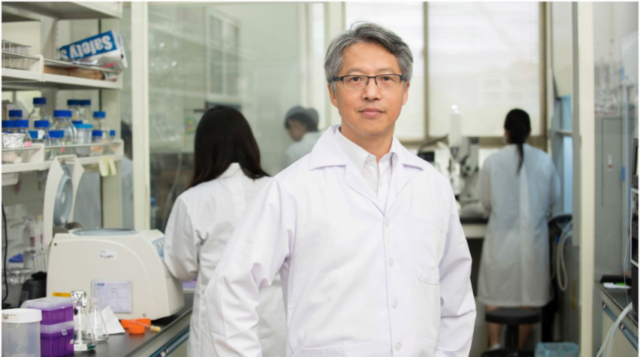
James Liao in his laboratory at Academia Sinica. Image courtesy of Chong-Sheng Liu (Academia Sinica, Taipei, Taiwan).
Dr. James C. Liao, President of Academia Sinica, Taiwan, has been awarded the Gregory N. Stephanopoulos Award for Metabolic Engineering. The award is given to a prominent scientist or engineer who has made seminal contributions to the industrial translation of basic developments in metabolic engineering, or quantitative analysis, design and modeling of metabolism. Dr. Liao will receive the award at the Metabolic Engineering Conference taking place in Singapore organized by the International Metabolic Engineering Society (IMES).
Contributions
Professor Liao has a long history of innovative contributions in the analysis, design, and engineering of metabolic systems.
He made several game-changing innovations, both in genetic alteration of organisms, and in computational methodologies. He is the inventor of the high-flux isobutanol bioproduction technology, which is now commercialized by Gevo, Inc (Englewood, Colorado). He is the first to demonstrate direct conversion of CO2, cellulose, or waste protein to isobutanol, n-butanol 2-methyl- 1-butanol, or 3-methyl-1-butanol as drop-in fuels. In addition, he developed an integrated electro-microbial process to convert electrical energy to chemical energy in liquid drop-in fuel.
Recently, he developed the first synthetic methylotrophic E. coli that can grow with methanol as the sole carbon source. These accomplishments are all based on his fundamental scientific research with metabolic modeling techniques and insights.
Research
Dr. Liao’s research has focused on metabolism, including its biochemistry, regulation and redesign. Currently, his work includes design and engineering biochemical pathways for CO2 fixation and production of fuels and chemicals.
The award
In collaboration with the AIChE Foundation, the Stephanopoulos Award is supported through the generosity of donors, including many close colleagues and friends of Greg familiar with his impact. If you are interested in joining to advance the award, please contact Natalie Krauser at natak@aiche.org.
About IMES
The International Metabolic Engineering Society promotes the use of metabolic engineering — the optimization of the genetic and regulatory processes within cells — as an enabling science for bio-based production of advanced materials, pharmaceuticals, food ingredients, chemicals, and fuels. One of its venues for collaboration and information exchange is the biannual Metabolic Engineering Conference, where practitioners share knowledge and discuss current developments made in the field.
Source from
Posted on 06/14/2023

